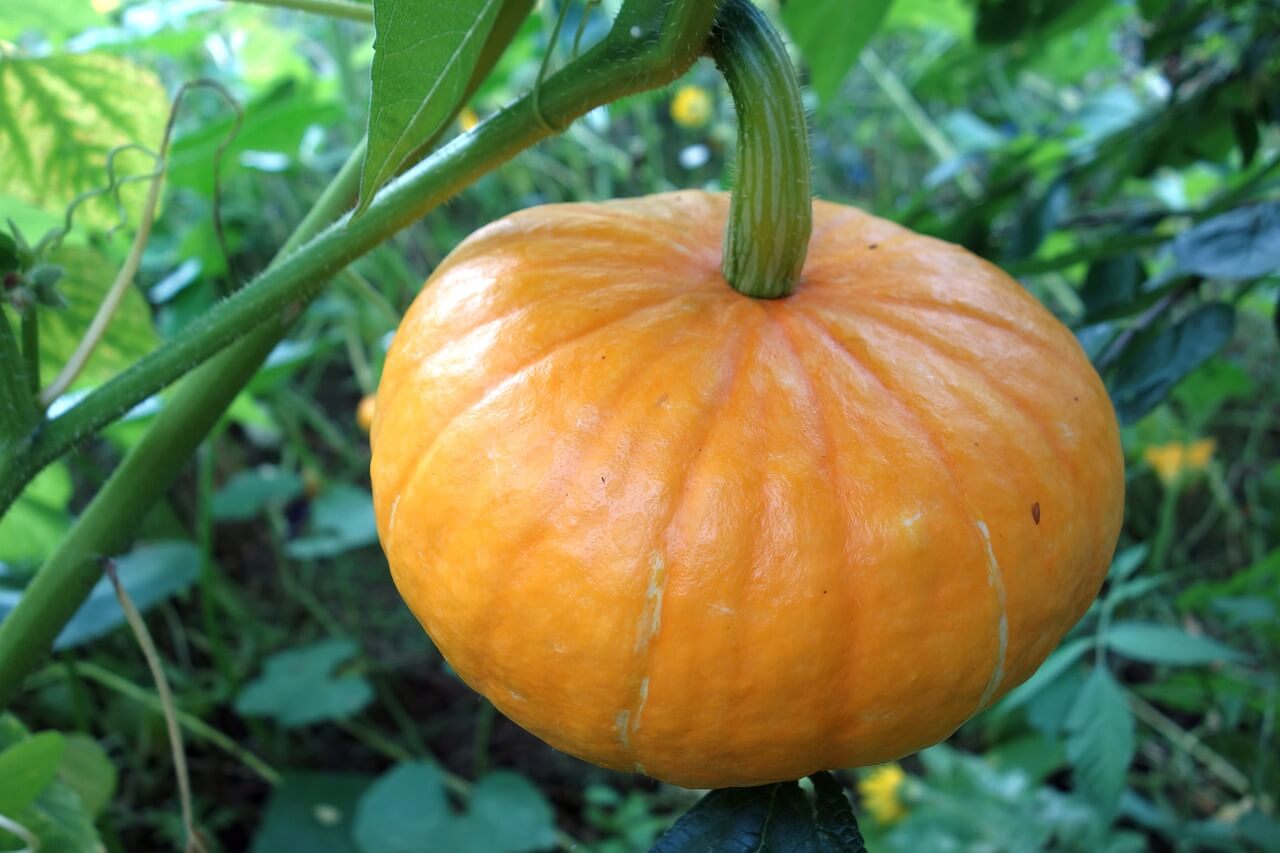A Guide to Growing Pumpkins Vertically in a Small Space
August, 2022 |Pumpkins are a fantastic vegetable to grow vertically. Their long vines and large leaves can take over small spaces quickly, so growing pumpkins vertically is a great way to optimize your mini garden space.
Which pumpkins can you grow vertically?
You can grow any pumpkin variety vertically, although you may want to avoid enormous varieties like the Atlantic Giant! If you choose a large pumpkin variety you have to make sure you have strong vertical support that can hold the weight of large fruits.
Disclaimer: This post contains affiliate links. When you make a purchase through one of these links I may earn a commission. This comes at no extra cost to you.
A medium or mini pumpkin variety is best. However, even these pumpkins may still need a melon sling or hammock to support the weight as they develop. Heavy pumpkins can break the stem and even the vine, not to mention you’ll lose the pumpkin itself.
Some of my favorite mini pumpkin varieties:
- Small Sugar Pumpkin: A sweet variety ideal for pumpkin pie making.
- Baby Boo: A mini white pumpkin that looks great as Halloween decor!
- Jack Be Little: A classic orange pumpkin in a miniature size!
My favorite medium-sized pumpkin varieties:
- Jack ‘o’ Lantern: A classic for Halloween and pumpkin pie!
- Queensland Blue: An unusual squash variety with blue/green skin!
- Harvest Moon: Another classic pumpkin that’s perfect for carving

Which vertical supports should you use for pumpkins?
Pumpkins can become very heavy, especially with lots of pumpkins hanging from them! So, like vertically growing melon plants, you need to choose sturdy support.
Strong vertical pumpkin supports include:
- A wooden pergola (train pumpkins up the sides and across the roof)
- A wooden or metal trellis (a-frame or single panel)
- Two stacked tomato cages secured together with zip ties
- An archway
- A planter combined with a frame, like this planter box and trellis from Amazon

If you’re growing pumpkins in containers, make sure the support is close enough so you can easily tie in the floppy stem of the developing pumpkin plant. And if you’re using netted support, make sure the pumpkins don’t get stuck in between!
How to train your pumpkin plant to a support
As the seedling matures into a trailing vine it’s time to start tying it to your chosen vertical support. If you have a latticed trellis or wire frame, you may be able to weave the growing end between the holes as it grows. If you’re using a standard square trellis you may need to tie the vine to the support using twine.
As you create a knot, make sure you leave enough space for the vine to grow wider, otherwise, it could create a tourniquet effect that kills off the vine.
Things will seem slow initially, but as soon as a few large leaves form, the pumpkin vine will be shooting up the support in no time. The vine will also send out little tendrils that will wrap around the trellis or frame for extra support. Check back every few days to tie up any new growth that’s flopping over.
Supporting heavy pumpkins
As your pumpkins begin to grow, they’ll need a form of support to stop them from damaging the plant. It’s an issue you’ll come across when growing melons vertically too. So, support your pumpkins with a melon sling or hammock to stop them from falling onto your balcony or deck. Note that even some mini pumpkin varieties need support.

Tips for growing pumpkins vertically
Growing pumpkins vertically is a great way to maximize space in your garden. Their bright color can look really attractive when hanging around an archway or balcony trellis. To make sure your vertical pumpkins thrive, check out our growing tips below.
- Consider choosing a medium or mini pumpkin variety.
- Place the plant in an area that receives lots of sun.
- Make sure you use strong supports, especially if you’re growing larger pumpkins.
- Don’t forget to add a melon sling to pumpkin fruits that are starting to weigh on the vine.
- Keep the soil around the plant well-watered, but not waterlogged, especially as the fruits are developing. Make sure you keep the leaves dry to avoid powdery mildew.
- Like melon plants, pumpkins are heavy feeders so add organic fertilizer to the soil before planting and top up when the fruits begin to form.







